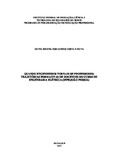Quando engenheiros tornam-se professores: trajetórias formativas de docentes do curso de Engenharia Elétrica (IFPB/João Pessoa)

Visualizar/
Data
2015-07-16Autor
Silva, Silvia Helena dos SAntos Costa
http://buscatextual.cnpq.br/buscatextual/visualizacv.do?id=K4394590J9
Metadado
Mostrar registro completoResumo
The creation of the Federal Institutes of Education, Science and Technology (IFs) in 2008 and
its expansion, resulted in the hiring of a large quantity of graduates with degrees in
Engineering, among others, to teach in these institutions. It’s in this context of the
Professional and Technological Education (PTE) expansion which originates the course of
Electrical Engineering from IFPB/Campus João Pessoa. Considering that these teachers
engineers did not have a pedagogical training in their initial course, our central question is:
how these engineers became teachers? This study is questioning the trajectories of these
academic and professional teachers. The research methodology is qualitative. We opted for
the (auto) biographical method, due to the fact that the narratives of teachers life histories
allow a reflection on themselves, the others and their context, in a education perspective. The
first results of the investigation, with six teachers engineers of the course of Electrical
Engineering from the IFPB/Campus João Pessoa, from their academic production in the
Lattes Platform, showed us, as to the level of academic degrees, most had their doctorate in
specific areas and good intellectual production. The interviews were audio-recorded,
transcribed and subjected to content analysis, which was distributed in categories: choose the
engineering and academic experience; professional integration in teaching; formative
experiences in the classroom; teacher professional development. The reports of respondents
revealed that they chose teaching in a not planned way, prevailing contingencial aspects.
Teachers recognize the lack of a pedagogical training, but have not invested in this type of
training in the post-graduation, in a systematic way. In their classroom experiences, they use
strategies to deal with stress and adversity, such as: have their teachers as a reference; invest
more time in the preparation of classes; interact with more experienced peers; be aware to
their students and their demands. Are seen both as engineers and teachers and they show to be
personally and professionally successfull, and none of them expressed dissatisfaction or the
possibility to leave the profession. The construction of the teaching of these teachers was
made by their disciplinary knowledge, the experiential knowledge of the classroom,
interacting with students and colleagues. This study also points to the importance of further
discussion about the professional development of teachers, specifically those graduating
teachers from bachelor courses and that work in PTE, in the IFs and out of these.



